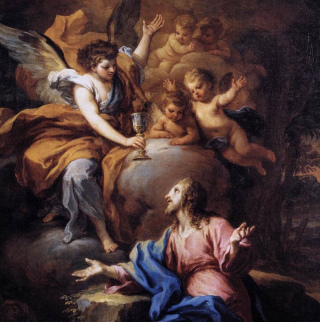What was the mysterious cup that Christ fervently prayed would "pass from me," meaning he would not have to experience the fullness of what it symbolized (see verse 42)?
Jesus requested of the Father "this cup pass from me" when he, in the Garden of Gethsemane, prayed just before being betrayed by Judas Iscariot and arrested. Was He fearful regarding the physical abuse he would receive before being condemned to die? Was he concerned that his suffering would tempt him to SIN?
Many times, it is difficult for humans to face their impending death. Jesus, however, all during his ministry (and possibly many years before it) not only knew he would have to die as the Lamb of God but also had perfect faith that the Father would raise him from the dead (Mark 10:32 - 34, see also Luke 9:22, Matthew 16:21, 17:22 - 23).

Jesus was not afraid of suffering and dying, of itself, as it was for these purposes that he divested himself of his eternal existence as part of the Godhead to assume the form of a human (see Hebrews 2:9, 10:10, 12, 14)!
Cup of His Wrath
If Jesus did not agonize over his impending suffering and death, then what did he desire to avoid? The New Testament DOES discuss a terrible cup that, in the near future, sinning humans will be forced to drink.
And a third angel followed them, saying with a loud voice, "If anyone worships the beast . . . He shall also drink of the wine of the wrath of God . . ." (Revelation 14:9, HBFV).
The cup Jesus dreaded to drink from was his Father's wrath against sin. Nelson's Bible Commentary on Matthew 26:36 - 39 makes an interesting comment in this regard.
". . . Jesus questions the will of the Father as to the necessity of drinking the cup. While this may refer to death ("he tasted death") it is more likely that the cup represents the wrath of man's sin-bearer.
"In the awful anguish of that moment, the sin of the world was poured on Christ and He became "sin for us" (2Corinthians 5:21). Thus, the Righteous One dies a substitution death for guilty mankind."
By taking upon himself the sins of the entire world Christ not only made forgiveness possible but also made available protection from God's wrath (Romans 5:8). The apostle Paul further confirms this fact in 1Thessalonians 1:10.
The Sin of Man
Near the end of Christ's six-hour ordeal on the cross he cried out something that has a direct bearing on the "cup" he ultimately drank. He stated, "My God, My God, why have You forsaken Me?" (see Matthew 27:45 - 46, HBFV).
What caused the Father to forsake Jesus at this critical moment when He was with him all during his physical life? It seems highly likely that it was at this moment that God placed the sins of ALL humans upon Christ.
After Jesus literally BECAME sin (2Corinthians 5:21, 1John 3:5, etc.) the eternal contact he enjoyed with the Father was severed (it is sin that separates anyone from God, see Isaiah 59:2) and he experienced his wrath for sin.
When Christ requested, "let this cup pass from me," he was asking that, if it were possible, that he would not have to experience separation from his Father and have to endure his wrath against sin.